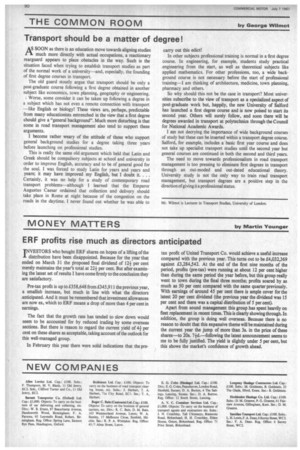Transport should be a matter of degree!
Page 92

If you've noticed an error in this article please click here to report it so we can fix it.
ANSOON as there is an education move towards aligning studies much more directly with actual occupations, a reactionary rearguard appears to place obstacles in the way. Such is the situation faced when trying to establish transport studies as part of the normal work of a university—and, especially, the founding of first degree courses in transport.
The old guard stoutly argue that transport should be only a post-graduate course following a first degree obtained in another subject like economies, town planning, geography or engineering. . Worse, some consider it can be taken up following a degree in a subject which has not even a remote connection with transport —like English or biology! These views are, perhaps, predictable from many educationists entrenched in the view that a first degree should give a "general background". Much more disturbing is that some in road transport management also tend to support these arguments.
I become rather weary of the attitude of those who support general background studies for a degree taking three years before launching on professional studies.
This is really the same old argument which held that Latin and Greek should be compulsory subjects at school and university in order to improve English, accuracy and to be of general good for the soul. I was forced to study Latin for years and years and years; it may have improved my English, but I doubt it. . . . Certainly, it was no help for a study of contemporary road transport problems—although I learned that the Emperor Augustus Caesar ordained that collection and delivery should take place in Rome at night because of the congestion on the roads in the daytime. I never found out whether he was able to carry out this edict!
In other subjects professional training is normal in a first degree course. In engineering, for example, students study practical engineering from the start, as well as theoretical subjects like applied mathematics. For other professions, too, a wide background course is not necessary before the start of professional training—I am thinking of architecture, medicine, town planning, pharmacy and others.
So why should this not be the case in transport? Most universities subscribe to the view of transport as a specialized aspect of post-graduate work but, happily, the new University of Salford has launched a first degree course and is now poised to start its second year. Others will surely follow, and soon there will be degrees awarded in transport at polytechnics through the Council for National Academic Awards.
I am not decrying the importance of wide background courses of study but these can be inserted within a transport degree course. Salford, for example, includes a basic first year course and does not take up specialist transport studies until the second year but general courses are continued in both the second and third years.
The need to move towards professionalism in road transport management is too pressing to eliminate first degrees in transport through an out-moded and out-dated educational theory. University study is not the only way to train road transport management, but transport degrees are a positive step in the direction of giving it a professional status.




































































































































